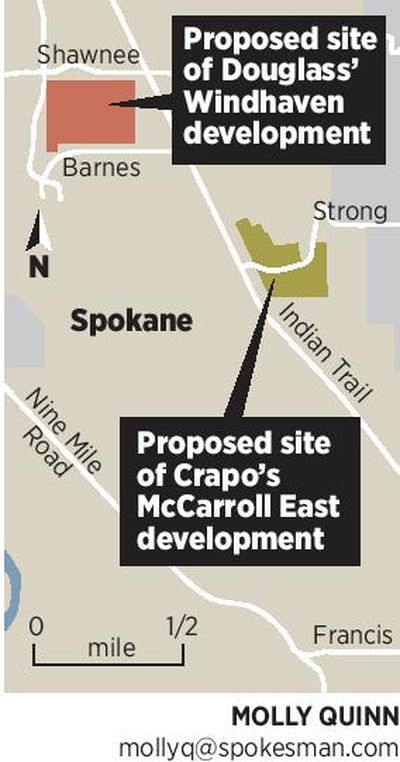Indian Trail development moving forward

The developer of a controversial Indian Trail neighborhood project will no longer seek a change in land-use laws, a move that would have allowed the construction of up to 400 duplex units that has irked neighbors with traffic concerns.
Instead, about 150 new residential units will be built under existing zoning rules.
The decision largely avoids public comment, part of the long process that goes with land-use changes, but keeps existing density restrictions in place.
Dennis Crapo, the project land’s owner, and Dwight Hume, who represents Crapo, said in a letter to the city that they had “decided to withdraw our application” for an amendment to the city’s Comprehensive Plan, which guides development within the city, but gave no explanation.
This week, Hume said the change in plans came after a city employee “called us back and showed us ways we can do what we want to do without seeking the amendment.”
Though Hume said the end result and number of units planned for the development won’t change, the process by which the project is approved is very different. The developers say the change they were seeking would have allowed significantly more residential units on the property than they actually planned to build.
According to Lisa Key, the city’s planning director, Crapo and Hume still will need approval from the city’s hearing examiner to complete their project. They also will have to conduct a traffic study and provide mitigations for traffic impacts from the development.
However, if Crapo and Hume had gone forward with the amendment process, a robust public process would have been followed. Various city, county and state agencies would have reviewed the proposal, an environmental study done, the public would have been given a chance to comment, and the city’s Plan Commission would have held hearings and made a recommendation to the City Council, which would have made the final decision on the project.
Key said the decision avoids a yearlong deliberation, which was unnecessary considering what Crapo and Hume are proposing.
“They were looking to get to the same number of units, possibly a few more, than what they were already approved for,” Key said.
Council President Ben Stuckart approved of the decision, noting that it prevents a future developer from building even more units on the property’s 26 acres.
“They would’ve been allowed to build much denser, even though they weren’t planning on it,” Stuckart said of Crapo and Hume.
Terry Deno, chairman of the Indian Trail Neighborhood Council, said the decision was “good.”
“We said from the very beginning if they went with the original zoning, we wouldn’t oppose it,” he said. “We didn’t have any problem with the original zoning at all.”
The current zoning rules were approved in 1994, when Crapo got the green light to build 257 single-family units, 30 duplex units and 11 large or undivided parcels on the plat. Part of that agreement stipulated that a traffic study would have to be done when 140 single-family units were built.
Crapo’s withdrawal still leaves another contentious project facing Indian Trail residents. Harley Douglass has a proposal to build from 742 to 1,485 apartment units just west of Indian Trail Road and north of Barnes Road. The project also requires a change in land-use rules, which currently allow a maximum of 10 residential units per acre. Douglass has requested the city triple that limit, to 30 units per acre.
Douglass’ plan is subject to the public process required by any changes to the city’s Comprehensive Plan. Neighbors largely oppose the project, citing traffic concerns.
Meetings discussing the proposed changes to land use rules have brought out hundreds of people who oppose the change. A decision on the proposed land use changes will not come before City Council until the end of the year.